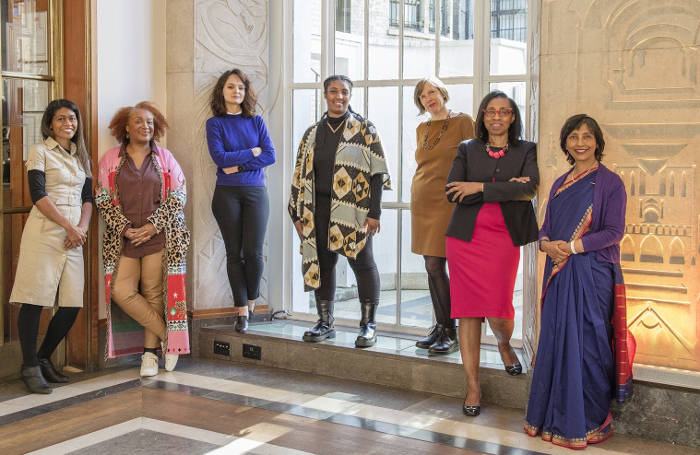“All seven of us either previously knew each other, or had a shared connection somewhere,” explains Annette Fisher, founder and co-chair of Unionne.
“I had spoken to different individuals about how great it would be to have a major project entirely designed, procured and built by women: a big ‘she build’. Something significant that would shift mindsets.”
Unionne is a diverse consortium comprised of seven female architects, almost all of whom run their own practice or consultancy. The catalyst for its formation was the opportunity to bid for a large framework offered by Southwark Council and run by specialist procurement consultants LHC.
The London borough had faced a substantial criticism over the notable absence of diversity when it announced the initial 110 appointed architects in its 2018 round. It decided to reopen the tender process to add a further 14 firms with selection weighted towards diversity. Fisher, who founded her practice FA Global in 1997, discussed the possibility of applying with her friend Teri Okoro, founder of the practice TOCA.
“Our immediate thought was ‘How can we win this?’,” Fisher explains. “We knew that the collaborators we had in mind would be one person bands: diverse-led practices tend to be smaller. How could we create an instant bigger practice to bring complementary strengths and abilities together, to offer something unique?”
In January 2021, Unionne became a limited company, with Fisher and Okoro as directors and co-chairs, and with architect and environmental consultant Cheryl Pilliner-Reeves as a third director.
Practitioners Angelene Clarke, Anamaria Pircu and Architects for Change founder Sumita Singha were named as partners. Support from a large practice was provided by Helen Taylor, Director at Scott Brownrigg. The framework bid was submitted at the end of that month.

There were seven lots on offer and the new practice were strategic in which they applied for, assessing which they were capable of winning and which might be overcrowded.
“We applied for three lots, the maximum you could apply for,” Fisher reveals. “Lot 3 was housing and we went for the first band of up to £5 million turnover.”
“Lot 4 was for commercial and industrial work. We went for the second band of £5 to £20 million turnover: we thought it would be less oversubscribed than the lower one. Then we also went for Lot 7, reserved for small practices.”
They won two lots: numbers 3 and 4.
One of the biggest hurdles facing the new business was being able to show its financial history. Fortunately, Southwark’s procurement consultant LHC had provided three options of what to provide, one of which was simply a financial forecast. Unionne drew up a forecast based on the anticipated fees they would get from projects they expected to win on the framework once it was up and running.
However, when Unionne was shortlisted for interview they were then asked to present three years’ accounts. The team debated what to do and decided to (politely) object to this. Fisher explains that they carefully drafted a letter politely reminding LHC that it had offered a ‘forecast only’ option.
“We were very determined and stated our case, explaining that we wanted to set a precedent,” Fisher explains. “We tried to convey that this was a landmark opportunity not just for us, Southwark and LHC, but for the future of the framework procurement process.”
“The interview process was quite a challenge,” states Cheryl Pilliner-Reeves. “There were six of us in a Zoom meeting, so we had strength in numbers. We had been coordinating the presentation and practising delivery. But it was really helpful that LHC was willing to look at an alternative type of bid.”
Being on a high-profile framework is a great calling card, and has been a springboard for bidding for other projects. Unionne went after five projects in 2021 and won four of them, and has been bidding for a place on additional frameworks.
Pilliner-Reeves explains that Unionne operates under a relatively simple Memorandum of Understanding, which avoids any legal complexities. Their arrangement is that the umbrella practice take a small percentage of fees from work brought in by one of the members, but the vast majority of the fees going to the practice working on the project.
Two of Unionne’s young partners, Angelene Clarke and Anamaria Pircu, have bid separately in their own right to get their own practices onto the Greater London Authority’s design framework, having seen how the process worked at Southwark and gained confidence from it.
The biggest advantage, Fisher notes, is that opportunities now come knocking at Unionne’s door.
“As individuals we have had to work really hard for commissions over the years,” Fisher reflects. “So to have people coming to us and inviting us to participate is a huge plus. We still seek out work but it’s a real sea change to have other organisations inviting us to participate."
Thanks to Annette Fisher, Founder and Principal, FA Global; and Cheryl Pilliner-Reeves, Director, PR Architects.
Text by Neal Morris. This is a Professional Feature edited by the RIBA Practice team. Send us your feedback and ideas.
RIBA Core Curriculum topic: Business, clients and services.
As part of the flexible RIBA CPD programme, professional features count as microlearning. See further information on the updated RIBA CPD core curriculum and on fulfilling your CPD requirements as a RIBA Chartered Member.









